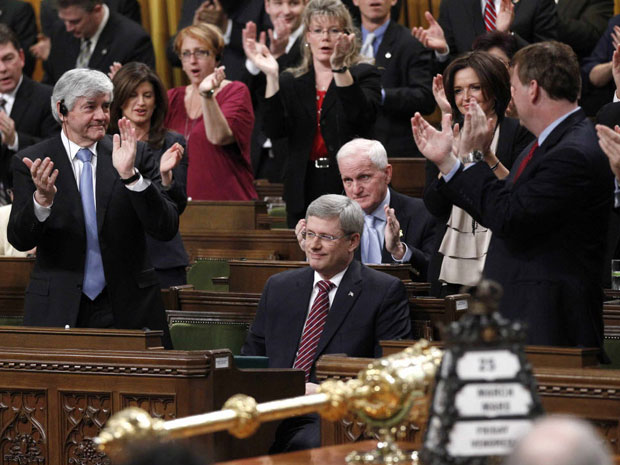World: Summary: Explaining Canadian politics (and Stephen Harper) to Americans
- Stephen Harper has some pretty huge problems right now. The Canadian Prime Minister’s government was found in contempt by the House of Commons — the first time that’s happened in the country’s history. The situation, pushed by a coalition led by the minority Liberal party, promises to add an interesting twist to Canadian politics over the next six weeks. “The principle at stake in this debate goes to the heart of parliamentary democracy: the obligation of a government to provide members of this House with the information they need in order to hold the government accountable to the people of Canada,” said Liberal Party leader Michael Ignatieff. Now, we understand that many of our readers may not know much about Canadian politics, so here’s a quick explanation of what’s going on:
- What happened? Stephen Harper’s Conservative minority government was found in contempt — the first time that’s happened in Canadian history. The contempt vote, pushed by minority parties, also doubled as a no-confidence vote.
- What’s next? Tomorrow, Harper is expected go to the Governor-General David Johnston to dissolve parliament. In May, Canadians would vote in the country’s 41st election — the country’s fourth election in roughly seven years.
- The reason The three major minority parties — Liberals, New Democrats and Bloc Quebecois — say that the Harper government kept them in the dark on the budgetary elements of certain pieces of legislation, which led to the contempt vote. source
- » Other frustrations: The minority parties also have shared frustrations in Harper’s corporate tax cuts and push for increased defense spending on military jets — allowing for the opposition parties to find common ground. If they were to gain control, expect these things to be targets.
How the party lines break down
- A plurality government with no majority: The House of Commons — the main voter-elected body in the Canadian government — has led with a plurality government for a few years, strengthening their hold in 2008, but with the 308 seats up for grabs a little over four weeks, the body could change significantly. While polls suggest Harper’s Conservatives could gain a majority this time out, if they don’t, it’s possibile that the three main minority parties (along, possibly, with the Greens, who currently don’t have a seat in the House of Commons) could form their own coalition, forcing Harper off his perch entirely. Here’s what the House of Commons looks like now:
- 143 Conservatives seats in the House of Commons
- 77 seats are held by the Liberal Party
- 47 seats are held by Bloc Quebecois
- 36 seats are held by the New Democratic Party
- » Minor members and the Senate: On top of the parties here, two of House of Commons seats are held by independent candidates, and three seats are currently empty. Also of note: The Canadian parliament also has a Senate, but it isn’t directly elected, is kind of a messy situation of its own, and holds no say over the situation with Harper or the government. Harper’s job lies in the hands of the confidence of the House of Commons — which he just lost. (By the way, our boy Ilya Gerner has a pretty interesting take on the whole Canadian plurality system worth checking out.)
Harper’s take on the issue
Unfortunately, Mr. Ignatieff and his coalition partners in the NDP and Bloc Quebecois made abundantly clear that they had already decided they wanted an election instead, Canada’s fourth election in seven years, an election Canadians had told them clearly that they did not want. Thus the vote today, which obviously disappoints me, and will, I suspect, disappoint most Canadians.
Canadian Prime Minister Stephen Harper • Discussing his frustrations with the current contempt vote. The polls seem to suggest that many back Harper’s take on the situation — the party still holds a strong plurality in two recent polls, and in one holds over 40 percent — enough for the Conservatives to hold a technical majority. Other parties say that, either way, Harper’s uncooperative leadership style made his bed. “He made a choice,” said NDP leader Jack Layton “and that choice was to take us into an election.” source

